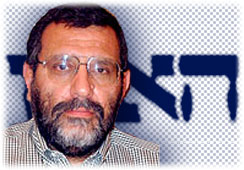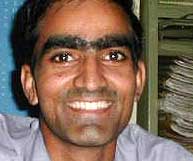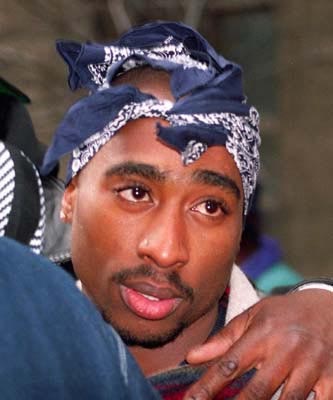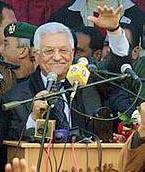In a blistering editorial, the Israeli daily Haaretz called the publisher of Not Another Israel Blog a "coward" and a "shit weasel."
 Does Haaretz have a new editorial policy
Does Haaretz have a new editorial policy
under Editor in Chief David Landau? 
The short piece was unsigned but submitted to Not Another Israel Blog from ISP 192.118.73.46. A simple online search revealed that this ISP belongs to a computer in Haaretz, a newspaper sometimes referred to as "The New York Times of Israel."
The text of the editorial follows:
AT LEAST BRADLEY BURSTON DOESN'T HIDE BEHIND HIS MIDDLE INITIAL BECAUSE HE'S TOO MUCH OF A COWARD TO PUT HIS NAME TO THE HATE HE SPEWS.
ISN'T THAT RIGHT XXXXXXXXX [-edited for security reasons by B] - FORMERLY OF HAARETZ INTERNET SITE BUT FIRED FOR BEING A SHIT WEASEL WHO COULDN'T HANDLE THE FACT THAT SOMEONE MORE QUALIFIED THAN HE WAS PUT IN A POSITION ABOVE HIM?
While the author of the Haaretz editorial chose to remain anonymous - as does B - it is known that the piece was submitted on Sunday sometime between noon and 1 P.M. Israel time.
It is not known whether the editorial was submitted or approved by Haaretz Editor in Chief David Landau, English Edition Editor Peter Hirschberg or any other senior member of the editorial staff.
But the use of the term "shit weasel," which is mentioned in the Stephen King novel Dreamcatcher, suggests that the Haaretz reporter behind the editorial is familiar with the works of the popular horror author.
Not Another Israel Blog is known to express opinions critical of the Israeli media, particularly Haaretz and The Jerusalem Post. The Haaretz editorial in question was apparently prompted by a recent post in which B opined that Haaretz correspondent Bradley Burston tends to open his pieces in an overly melodramatic style. While B expressed admiration for Burston as a writer and a journalist, he wrote that this drama detracts from the quality of Burston's work and was perhaps catering to the whims of an English-speaking audience outside of Israel.
"Personally I was surprised by the Haaretz editorial," said B, on condition of anonymity. "I'm flattered that the people at Haaretz are paying attention to my blog, but I'm not sure what the fuss is about now. I was only criticizing an aspect of Burston's writing style. There was nothing personal about it. Is that spewing hate?"
B said he doubted Burston was the author. "It's not his style and I don't think I wrote anything that would have upset him so much."
"I've also been critical of Jerusalem Post columnist Caroline Glick - so I don't think I'm playing favorites here," he added. "I'm just offering my view of news coverage in Israel - particularly that aimed at the English-speaking community - which I believe too often fails to live up to proper journalistic standards."
Media experts said that the Haaretz response to Not Another Israel Blog reflects frustration among established media with the growing popularity of blogs.
"The big traditional news sources feel threatened because more and more people are bypassing them in favor of alternative news sources," said Prof. Marty Rosen, who teaches journalism at the State University of New York at Albany. "But regular reporters need to be careful because blogs are not bound by the same rules as newspapers or TV networks. Blogs can get away with a lot more."
When asked why he continues to maintain his anonymity, B said that it was crucial to his work.
"Any experienced journalist understands the importance of anonymous sources," he said. "Almost every major story in Haaretz has anonymous sources."
"In my case, I'm the reporter and the source. In some cases I'd like to reveal my identity so I can take credit for my work, but doing so would put restrictions on what I can write about, and breaking them could jeopardize my job."
B said bloggers would continue their work and not be intimidated by such scare tactics by traditional news media.
"I know it's Israel, not America, but I believe freedom of speech is still valued by many here, particularly journalists," B said. "If someone at Haaretz thinks he or she can stop me or my fellow bloggers from expressing our opinions, they're mistaken."









